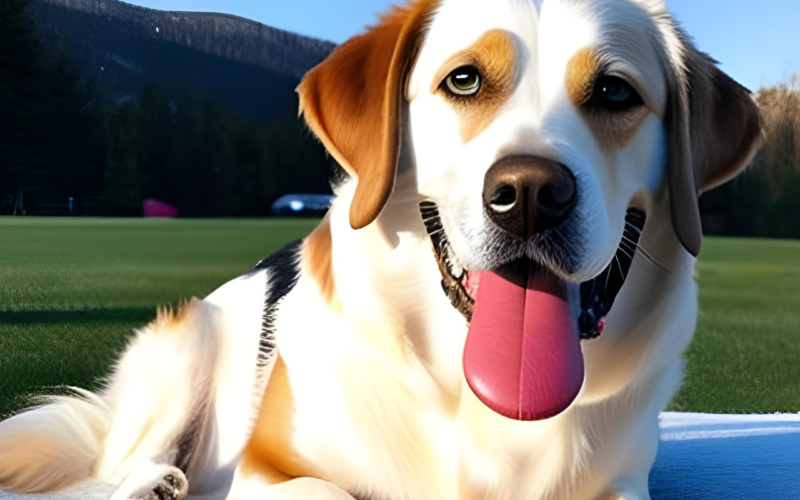If your dog keeps sticking his tongue out and swallowing, it could be a sign of medical issues such as respiratory problems, dental disease, or nausea. It is essential to consult with your vet to rule out any underlying health concerns and obtain a proper diagnosis.

Pay attention to your dog’s behavior and seek immediate medical attention if you notice any additional symptoms such as coughing, vomiting, or lethargy. In most cases, early detection and prompt treatment can prevent your dog from experiencing any long-term impacts on their health.
With the right care and attention, your furry friend can live a happy and healthy life.

Credit: impersonateme.com
The Normal Tongue Behavior Of Dogs
Dogs use their tongues for a variety of reasons. The most common is to regulate body temperature, which they do through panting. Their tongues act as sweat glands and help circulate air to cool them down. Another reason for sticking tongues out is to moisten their noses and improve their sense of smell.
Additionally, dogs lick to communicate, to show affection, and even to taste their surroundings. It is important to note, however, that excessive panting or drooling can indicate a health issue or discomfort in your dog. Keep an eye on your furry friend and consult with a vet if you see any concerning behaviors.
By understanding the normal tongue behavior of dogs, you can ensure your pet’s health and happiness.
Reasons Why Your Dog May Be Sticking His Tongue Out Frequently
While it might seem cute or quirky, frequent tongue sticking in dogs may actually be a sign of health problems. One potential issue is heat exhaustion, which can affect dogs that don’t have sufficient access to shade and water. Additionally, certain medications may cause dry mouth, leading to more tongue sticking.
If your dog is excessively drooling, this could indicate dental problems or a foreign object stuck in the mouth. It’s also possible that your dog is experiencing anxiety or is trying to communicate with you – observe his behavior closely to see if there are any patterns.
In any case, if you’re concerned, it’s always best to consult with a veterinarian.
Treatment Options
To treat your dog’s persistent tongue sticking and swallowing problems, there are a number of potential treatment options available. First, explore natural home remedies and exercises that could help ease your furry friend’s discomfort. Adding a bit of coconut oil or honey to their diet may help to reduce inflammation in the mouth or throat.
Additionally, practice breathing exercises with your pup through their nose to help with swallowing issues. Further options include medication, surgery, or a change in diet. Don’t hesitate to consult your veterinarian for their professional opinion and advice on what treatment may be best for your dog’s specific needs.
Remember, every dog is different and requires individualized care in order to ensure their long-term health and happiness.
When To Call Your Vet
It’s not uncommon to see your dog occasionally sticking their tongue out and swallowing. However, if you notice this behavior becoming more frequent, it’s essential to think about calling your vet. When discussing the tongue sticking behavior, make sure to provide as much information as possible to your vet.
This can include the frequency of the behavior, any noticeable triggers, and whether your dog appears to be in discomfort. Additionally, you should mention any recent changes in your dog’s diet or behavior. Your vet may recommend a variety of actions, ranging from a simple change in diet to further testing or medication, depending on the underlying cause of the behavior.
Ultimately, it’s essential to reach out to your vet promptly if you believe your dog’s tongue sticking behavior is becoming problematic.
Understanding The Link
Frequent tongue sticking and swallowing in dogs can be linked to an array of underlying health issues. Dehydration, nausea, dental problems, throat irritation, and respiratory problems can trigger these behaviors. Some breeds with shorter snouts may also exhibit these habits more often.
However, if these behaviors become excessive, it can be a sign of a more serious medical condition. These may include neurological disorders, neuromuscular diseases, or gastrointestinal issues. It’s essential to monitor your dog’s behavior and schedule regular check-ups with your veterinarian.
They can help identify any potential health problems and recommend the best course of treatment for your four-legged friend.
Health Issues To Watch Out For
It’s imperative to take your furry friend to the veterinarian when your dog sticks out their tongue and swallows. There are various health issues that lead to these behaviors. Tongue sticking might indicate that your dog is hot, distressed, or has a dental problem.
Swallowing might suggest sore throat, dry mouth, or cancer; hence your dog needs to be checked immediately. Other possible diagnoses include neurological disorders, digestion issues, and organ malfunctions. Even if your dog’s habits appear to be trivial, the concern is worth addressing, as underlying issues can be serious.
It’s critical to detect health issues early to ensure that your dog receives appropriate therapy and lives a long, healthy life. Consult with a veterinarian promptly if your dog’s behavior persists or becomes more frequent.
When To Contact Your Vet
If your dog has been frequently sticking out their tongue and swallowing, it may be a cause for concern. As a responsible owner, you want to know when it’s time to call your veterinarian. When discussing your dog’s behavior with your vet, it’s important to provide specific details, such as how often it occurs, when it started, and if it’s accompanied by other symptoms.
They may also ask about your dog’s diet and behavior. By being thorough and transparent with your vet, you can ensure that your dog receives the proper diagnosis and treatment. Don’t hesitate to reach out to your veterinarian if you notice any concerning behavior from your furry friend.
It’s always better to be safe than sorry.
Frequently Asked Questions
Dogs stick their tongues out for many reasons, including to cool down, communicate, or relieve anxiety. If your dog is persistently sticking their tongue out and swallowing, they may have an underlying medical condition that needs to be addressed.
Yes, if your dog’s tongue is hanging out and they can’t seem to keep it in their mouth, it could be a sign of dehydration. Other symptoms include dry gums, sunken eyes, and lethargy. Make sure they have access to fresh water and seek veterinary care if symptoms persist.
Sometimes a dog’s tongue can get stuck out due to injury or nerve damage. If you notice your dog is having difficulty retracting their tongue, it’s important to see a veterinarian to evaluate the issue, as it can cause irritation and discomfort.
If your dog is persistently swallowing, it could indicate an underlying medical condition, such as acid reflux, nausea, or an obstruction in their digestive tract. If you notice other concerning symptoms in addition to the swallowing, such as vomiting or diarrhea, it’s important to seek veterinary care.
Excessive drooling can be a sign that your dog is experiencing discomfort or pain, which could be related to an underlying medical condition. If your dog is persistently drooling and/or experiencing other symptoms, it’s important to see a veterinarian to address the issue.
Conclusion
After thoroughly exploring the possible reasons why your dog keeps sticking his tongue out and swallowing, it is clear that there could be a number of underlying issues leading to this behavior. It could be something as simple as thirst or perhaps a dental issue, but it could also be a symptom of a more serious medical condition such as tracheal collapse or heart disease.
It is important to monitor your dog’s behavior and consult with your veterinarian if this behavior continues or worsens. As a responsible pet owner, it is also important to ensure your dog is receiving adequate exercise, a healthy diet, and regular check-ups.
By addressing any potential health issues and keeping a close eye on your pup, you can ensure they live a happy and healthy life. Remember, always listen to your dog’s body language and behaviors, it is up to us to be their advocates and provide the care they need to flourish.











